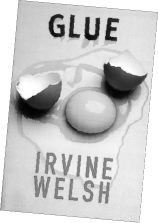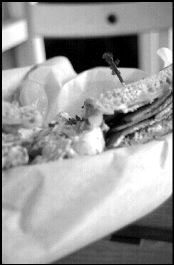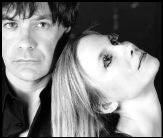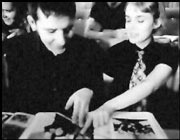GLUE by Irvine Welsh (W.W. Norton, $14.95)
LIKE IRVINE WELSH’S previous novels, Glue is teeming with sex, drugs, disease, and a wide assortment of lewd and loutish behavior. Unlike those works—particularly 1998’s carnival of brutality, Filth—Welsh’s latest largely spares the lurid details. Instead of lingering over the rituals of a junkie, he’s more apt here to delve into the aftermath of drug use. Welsh hasn’t gone soft—but his focus is slightly different, perhaps even higher.
While Welsh has written fiction with an underlying humanity before, his affection for his characters and his investment in their inner lives is simply more complete with Glue. The four Edinburgh housing project dwellers (Carl, Terry, Gally, and Billy) at the novel’s center are each fully realized. All four receive turns at narration, and sometimes the same events are told from multiple perspectives. Welsh employed a similar scheme in Trainspotting, but that novel’s hyperactive pace and focus on the character of Renton (who, along with other Trainspotting favorites, makes a cameo appearance in Glue) didn’t allow for the same level of intimacy. Here, we’re fully privy to the nature of these characters’ bonds as well as the seeds of their disputes. And because Glue unfolds itself more deliberately—it spans from the early ’70s to 2002—minor revelations and growth occur in a more natural, incremental manner.
If the characters themselves weren’t compelling, though, narration technique would be irrelevant. Their personalities indeed give Glue its flavor (there’s that colorful Scottish working-class vernacular at work again, too!). Each fits a universal type: Terry’s a smooth-talking, shiftless drunk; Gally’s the classic lovable loser; Billy’s a brooding athlete; and Carl’s sensitive and artistically inclined. However, Welsh draws each with enough flourishes and, more crucially, flaws that they never seem less than real. None of these blokes exemplify this better than Terry, a.k.a. “Juice Terry,” who’s perhaps the most memorable character yet in the Welsh universe. His lack of decorum is alternately hilarious and maddening, but his irresistible charm is so seductive that his astonishing success in sexual endeavors and the remarkable tolerance of his friends is completely believable.
Glue is in many ways a modern novel of manners. The code of ethics developed early in the book by Carl’s and Billy’s fathers provides a valuable framework for the boys. Commandments like “NEVER HIT A WOMAN,” “ALWAYS BACK UP YOUR MATES,” “NEVER LET A WEEK GO BY WITHOUT INVESTING IN NEW VINYL,” and “NEVER GRASS [translation: snitch on] FRIEND OR FOE” offer guidance for most of the moral cruxes that arise from love, career, and long-term friendship. Glue owes one of its most poignant moments, however, to a situation beyond the scope of these rules. Gally’s contraction of HIV invites painful moral ambiguity and is the truest test of character. It’s also a wrenching reminder of how complicated modern life has become.
THAT THE ACTION in Glue takes place over the last 30 years lends itself to one of Welsh’s greatest strengths: The author wholly understands the place of popular culture in his generation’s life and gracefully infuses this element into his writing. The magic of Elvis, the difference between tough lads and “Jam tarts,” the adolescent proving ground of the soccer (“fitba”) stadium, and the middle-aged solace of the karaoke bar are masterfully rendered. Welsh also follows up on a theme introduced late in Trainspotting: ecstasy and rave culture. Carl earns renown as a club DJ, and his enthusiasm for the music (Welsh smartly captures the thought process of a good DJ during an impromptu all-night party) and e-fueled giddiness present the lifestyle in accurate detail; his later drug problems also demonstrate the physical and mental toll exacted even by “happy” substances.
Glue isn’t perfect. Some of its plot points—especially the introduction of an American pop singer towards the end of the book—come off as clumsy. The neatness of its ending may also provoke charges of contrivance. In this case, though, Welsh’s apparent desire to resolve everything in the end doesn’t stem from laziness (or ease of screenplay adaptability); the tenderness he feels for these people is just so overwhelming that he’s unwilling to leave them in limbo. Ultimately, these blemishes are minor. Glue is a work of tremendous scope and the product of a supremely talented writer, one who—like his characters—clearly exhibits a capacity for growth.








